Syrian Kurdistan: Will there be peace and freedom?
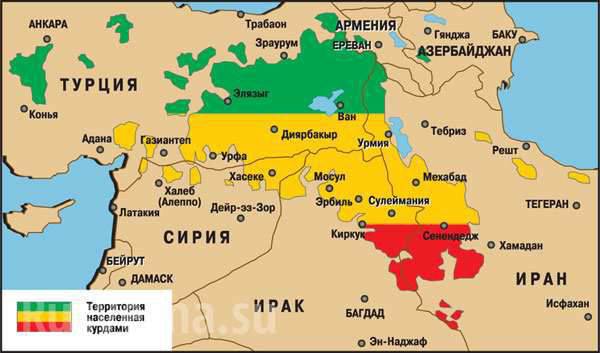
Iraqi Kurdistan - “exemplary autonomy”
The start of the "redrawing" of the political map of the Middle East, in fact, was given by the American invasion of Iraq, as a result of which the regime of Saddam Hussein and the Baath Party (Arab Socialist Revival) headed by him fell. It was after the Americans and their allies militarily overthrew Saddam Hussein that Iraq actually ceased to exist as a single centralized state. Iraqi Kurdistan - the northern part of the country, inhabited by Kurds and a number of other national minorities, among which the most prominent Assyrian Christians, gained serious political autonomy and in fact turned into a truly independent state. It was Iraqi Kurdistan that became a hotbed of resistance to the fundamentalists of the Islamic State. The Kurdish militia "Peshmerga" manages to maintain the territorial integrity of the autonomy and not let the radicals from the IG into its borders. On the other hand, it is on the territory of Iraqi Kurdistan that the most democratic and favorable political regime exists, which explains the massive confluence of thousands of refugees - Assyrians, Arabs, Kurds, Turkmen - from territories controlled by the Islamic State under the protection of the Peshmerga. Despite the fact that the majority of the population in Iraqi Kurdistan is Kurdish, speaking two dialects - Kurmanji and Sorani, autonomy can be called one of the most multiethnic and multi-religious regions of the Middle East, and certainly the most tolerant region. The following ethnoconfessional groups historically live in Iraqi Kurdistan: 1) Kurds are Muslims who practice Sunnism (but there is also a group of Shiite Kurds in the Khanekin region); 2) Yezidi Kurds - followers of the oldest Kurdish religion - Yezidism (Yezidis inhabit the Sinjar and Dahuk districts, here is their most important center - the temple of Lalesh); 3) Assyrians - the ancient people who are the flock of the Assyrian Church of the East; 4) Chaldeans - Arabs and Assyrians, who are believers of the Chaldean Catholic Church; 5) Turkmans, or Iraqi Turkmens; 6) Arabs, among whom there are also Sunnis, Shiites, and Christians; 7) Armenians living in Dahuk and Zakho; Kurdish Jews, or "lahlouhi". It should be noted that, despite the contradictions and even conflicts that are quite natural for any multinational region, at present Iraqi Kurdistan is practically free from serious clashes on a national basis, which is promoted by a balanced policy of the Kurdish leadership of autonomy. Despite the fact that the Kurds, the Muslims, are at the head of the autonomy, they are loyal to the Yezidis, Christians, Jews living in Iraqi Kurdistan. Iraqi Kurds have long-established ties with Russia, first with the pre-revolutionary, then with the Soviet Union, and after 1991 with the Russian Federation.
The fate of the Kurds in Syria
However, if Iraqi Kurdistan currently actually represents a real state education of the Kurds, being one of the most stable and economically prosperous regions of the de facto collapsing Iraq, the Kurdish territory in neighboring Syria - Syrian Kurdistan - faces numerous serious problems. In Syria, the Kurds have a much harder time than in Iraq, since their focus on creating their own state, or at least political autonomy, is held back by the central Syrian government of Bashar al-Assad, and neighboring Turkey, which is very negative about any attempts to create a national public education of the Kurds. In addition, in recent years, Syrian Kurds have faced a very dangerous and serious enemy - militants of the “Islamic State”, who also intend to extend their power and influence over the territory of Syria, including Syrian Kurdistan. Syrian Kurdistan is also called "Rojava", or Western Kurdistan. In the structure of the Syrian population, the number of Kurds reaches 9-10%, however many Kurdish figures consider these figures to be understated and speak about the number of Kurds in 15-20% of the population of the country. Most Syrian Kurds live in the northern and northeastern regions of Syria, adjacent to the Syrian-Turkish border, and also, like the Kurds of Iraq, are Muslims. As in Iraq, in the mountainous areas, where the Kurds constitute the majority of the population, the Yezidis also live, as well as the Assyrian Christians. Historically, the lands inhabited by the Kurds of Syria were part of the Ottoman Empire, and then came under the control of France, which gained control over the former Turkish possessions of Syria and Lebanon as a result of the First World War. It was during the period of French rule in Syria that the formation of the modern Kurdish autonomy and self-determination movement began.
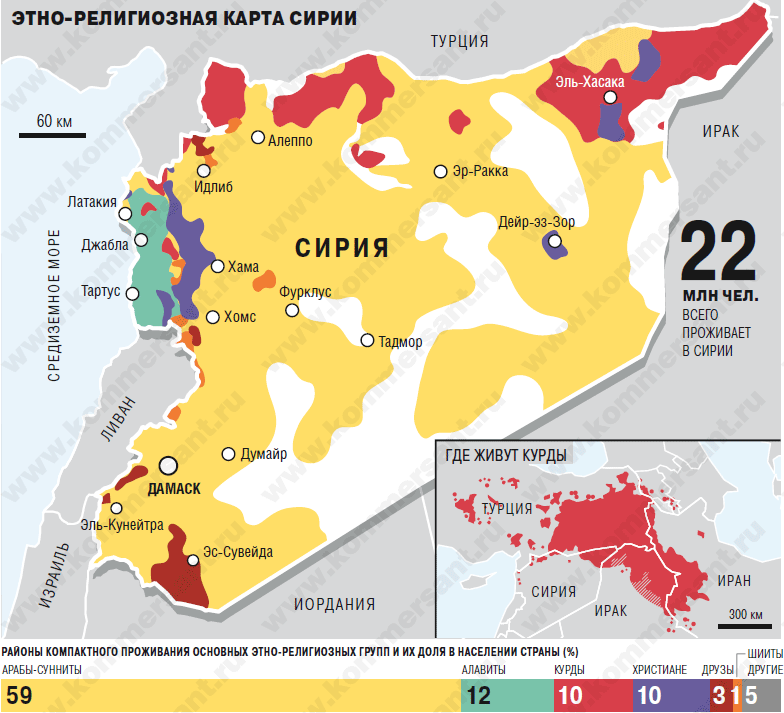
In 1930-s. Syrian Kurds under the leadership of Hajo Agi, sought to create joint with the Christians - Assyrians, Arabs and Armenians, Kurdish-Christian autonomy in the north of the country. Kurdish and Christian leaders were worried about the likelihood of discrimination of Kurds and Christians by the Arab majority if Syria’s political independence was declared and French troops were removed from the country, who were the guarantors of the security of the Kurdish and Christian population. However, France did not satisfy the requests of Kurdish and Christian leaders. After the proclamation of the sovereignty of Syria, their fears came true. The country's leadership has embarked on the construction of an "Arab state", Arab nationalism has become the dominant ideology in the country. Accordingly, the national minorities of the country were in a very unfavorable position. In an effort to minimize the likelihood of the spread of separatist sentiment in the provinces populated by Kurds, the Syrian leadership back in the early 1960s. has begun to implement measures to reduce the number of Kurdish population in the north of the country. In August, 1962 was held a special population census, following which about 20% of Syrian Kurds lost their Syrian citizenship. Moreover, the operation of deprivation of citizenship was carried out fraudulently - the Kurds were asked to surrender their identity cards for exchange, but they did not receive new ones. After that, all Syrian Kurds who lost their citizenship received the official status of "foreigners" or "unregistered". Accordingly, persons with these statuses were deprived of the possibility of acquiring property, employment, marriage, not to mention participation in the political life of the country. Many Kurds who lost their citizenship were forced to give real estate to settlers - the Arabs, who replaced the Kurdish population in the northern provinces. At the same time, Syria took part on the side of Iraq in suppressing the performance of Iraqi Kurds under the leadership of M. Barzani.
In 1973, the Syrian government resettled a significant number of Bedouin Arabs from the interior of the country to the Syrian-Turkish border. According to the leadership of Syria, the “Arabization” of the border areas would be able to “cut off” the Kurdish population of Syria from fellow tribesmen in neighboring Turkey and significantly reduce the likelihood of the spread of nationalist and separatist sentiments. It also envisaged a massive eviction of the Kurdish population to other areas of the country, the renaming of geographical names and other measures aimed at the “de-curdization” of Northern Syria. The anti-Kurdish policy of the Syrian leadership ultimately led to the fact that the Syrian Kurds became one of the most radical opponents of the political regime in Damascus. In search of probable allies, they turned to the United States of America and the countries of the European Union. After all, if Turkish Kurds could count on assistance from the USSR / Russia, then there was no one to hope for the Syrian Kurds - in the confrontation between Damascus and Syrian Kurdistan, Russia would unequivocally support Damascus, since Syria has always been a strategic partner of the Russian state in the Middle East. In turn, American and European political forces interested in overthrowing or, at least, weakening the ruling regime in Syria, saw in the Kurds the likely guides of their interests. As it turned out, they were wrong. The Kurds were never interested in total war against the same Bashar Assad - they were much more important in creating their own political autonomy, and if Damascus provided this opportunity, then the contradictions between the country's Arab elite and Kurdish leaders would be largely minimized. Therefore, the United States ultimately placed not so much on the Kurds as on religious fundamentalists — yesterday’s (supposedly) opponents. Fundamentalists in the Middle East have long become one of the key instruments of American influence on the policies of Arab states trying to be independent, but during the Arab Spring and subsequent events in Libya and Egypt, Tunisia and Yemen, and the same Syria, their importance in strategic US plans to change the map of the Middle East, has increased many times.
Rojava fights
The Iraqi and later Syrian Kurds, in addition to the Syrian army of Bashar al-Assad, became one of the most efficient and effective barriers on the victorious path of the Islamic State. When, with the support of the United States and the American satellites, the “oil monarchies” of the Persian Gulf, civil war broke out in Syria, the Syrian Kurds, largely contrary to Washington’s expectations, retained relative loyalty to the Bashar al-Assad regime. This was explained by the fact that the Syrian armed opposition was actively supported by Turkey - the main, after the fall of the regime of Saddam Hussein, an opponent of the Kurdish national liberation movement in the Middle East. Secondly, the Kurds were well aware that, following the likely coming to power in Syria of religious extremists who formed the backbone of the Syrian armed opposition, the position of national minorities and religious groups of the population would sharply deteriorate. If the Asad regime pursued a discriminatory policy against the Kurds, but at least it did not act openly through criminal methods, then one could not be expected from fanatics of softness to “other” ethnic groups and religions. Turkish Kurds from the Kurdish Workers Party stated that if the Turkish army invaded Syria, which was expected in 2011 as a possible measure to support the Syrian opposition, they would fight on the side of their Syrian fellow tribesmen against the Turkish interventionists. However, in 2012, the already tense relations between the Syrian government and Kurdish political organizations deteriorated. 12 July 2012 was actually proclaimed the sovereignty of Syrian Kurdistan, whose management passed into the hands of the Supreme Kurdish Council. Naturally, this could not but lead to an armed confrontation. Clashes broke out between Syrian government forces and the Popular Self-Defense Detachments, an armed organization uniting Syrian Kurds.
For quite a short time, the Syrian Kurds managed to defeat government forces, after which the troops loyal to Bashar Assad were driven out of the territory of Syrian Kurdistan. However, having gained real autonomy, the Syrian Kurds, as was to be expected, instantly lost interest in the fight against Bashar al-Assad. Everything that happened outside the territories with the Kurdish majority, or at least a significant number of the Kurdish population, was of little interest to the leaders of the Kurdish national liberation movement. But by the autumn of 2012, relations between the Kurdish national movement and the Free Syrian Army, the armed forces of the anti-Assad opposition, sharply deteriorated. At the end of October 2012, fighting took place between Kurdish units and opposition units in the vicinity of Aleppo. But then the Kurds again resumed cooperation with the Syrian Free Army. But the allied relations between the opposition and the Kurdish movement did not develop - again, because of the activities of religious radicals, who occasionally made provocations that forced the Kurds to engage in military operations against opposition units. In 2013, Arab-Kurdish clashes began in Hasek, which became a response to the anti-Arab demonstration of Arabs by Syrian government forces. At the same time, differences have grown within the Kurdish national liberation movement itself. After all, the Syrian Kurds did not demonstrate political unity - among them were both supporters of Iraqi Kurdistan’s leader M. Barzani and sympathizers of the Kurdish Workers Party, communists, as well as groups closer to the ideological attitude to religious fundamentalists. Nevertheless, the decisive role in the Kurdish national movement in the north of Syria belongs to the Democratic Union party, founded in 2003 and, in fact, controlling the detachments of the people's self-defense of Syrian Kurdistan. This party is under the strong ideological and organizational influence of the Kurdistan Workers 'Party operating in Turkey, which allows opponents to directly call it a branch of the Kurdistan Workers' Party in Syrian territory.
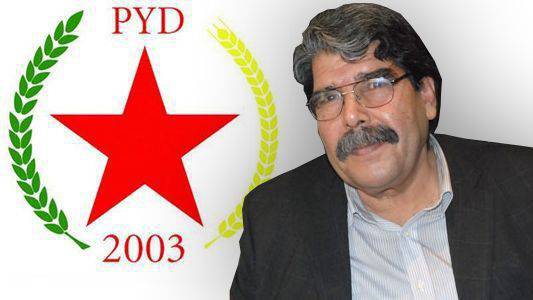
The Democratic Union Party is led by Salih Muslim Muhammad (born 1951), considered one of the most influential Kurdish politicians in the Middle East. Salih Muslim began his political activities in his youth, when he was a student at a technical university in Istanbul. For a long time, he worked as a chemical engineer in Saudi Arabia, then returned to Syria, where he actively participated in the activities of the Democratic Party of Syrian Kurdistan (a branch of the Barzanist Democratic Party of Kurdistan), but then left 2003 and joined the Democratic Union. In 2010, he was elected leader of the Democratic Union party. Since 2003, Mr. Salih Muslim, like many other Kurdish political figures of modern Syria, have been arrested and imprisoned several times for his public activities. He is currently a deputy to the National Coordinating Committee for Democratic Change. The son of Salih Muslim died in 2013 in a battle with the Islamists.
Incarnate utopia
The detachments of the people's self-defense (Yekîneyên Parastina Gel, YPG) is in some way a unique military organization. Formally, it is not the armed wing of any political party, and in fact, although it operates under the control of the Democratic Union, it includes people of very different political views, religious and even national affiliation. The number of people's self-defense detachments is estimated to be no less than 20 thousand people. In fact, the detachments represent the people's militia, in which commanders are chosen by democratic voting, and the political views of specific soldiers and commanders are considered as their private matter. It is known that foreign volunteers who come to Syrian Kurdistan from all continents - from Europe, Asia, America, Australia - are fighting in the squad of people's self-defense. A significant part of the volunteers are people from Russia, there are Americans, Canadians, Australians, citizens of European countries, including many with military background and real combat experience. In addition to the “adventure seekers” and professional “soldiers of fortune”, ideological leftists fight in Syria for the Kurdish militia, including members of the Turkish Maoist Communist Party of the Marxist-Leninist, Greek radical communist organizations. The Turkish Maoists in the spring of 2015 distributed a message about the formation of the International Brigade by the Communist Marxist-Leninist Party of Turkey, which would inherit the glorious traditions of the international brigades formed by the Communists to participate in the Spanish Civil War in the late 1930. on the Republican side. The “calling card” of the people's self-defense detachments is a huge percentage of women serving in combat units on a par with men. According to some reports, women and girls make up 40% of the personnel of the Syrian Kurdistan militia.
Since 2013 and for more than two years, the radical Islamists have been the main opponents of the Popular Self-Defense Forces of Syrian Kurdistan. It is against the Syrian opposition that the Kurds are fighting in the north-east and north of the country. The Islamists have declared the Kurdish national movement to betray the anti-Assad coalition, although at present the Kurds oppose both religious fundamentalists and the Assad government. Moreover, the leadership of the “Democratic Union” party, which dominates in Syrian Kurdistan, does not advocate the declaration of full political independence of the region, since the party adheres to more autonomist than separatist positions. The party sees its goal in creating a democratic Kurdish autonomy, on the territory of which, at the same time, representatives of all other ethnic groups in the region - Assyrians, Armenians, Arabs, Turkmen, etc. - can live. After the power of the central government of Syria was actually overthrown in Syrian Kurdistan, fundamental changes took place in the political structure of the region. The movement for a democratic society is broader than the Democratic Union Party, a socio-political movement in Syrian Kurdistan, and in fact it is on its basis that a new system of administrative and political management of the territories populated by Syrian Kurds has been formed. On the territory of Syrian Kurdistan organized by people's councils, elected by direct vote of local residents and performing the functions of local government and arbitration courts. The Soviets nominate deputies of the People’s Congress of Western Kurdistan.
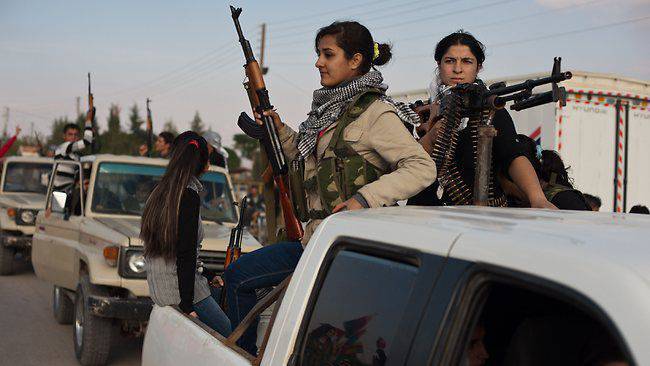
The doctrine of the organization of self-government in Syrian Kurdistan was based on the work of the famous Kurdish leader and ideologist Abdullah Ocalan, in which the founder of the Kurdish Workers Party seriously criticizes the idea of a national state and advocates democratic confederation. According to many researchers, the ideas of anarchism had a direct impact on the ideology of the Kurdish resistance, especially in the aspect of organizing the political management of society. It is known that while serving a life sentence in a Turkish prison, Abdullah Ocalan continues to improve his political knowledge, including familiarizing himself with the works of theorists of alternative socialist thought, including popular Western anarchist and eco-socialist authors. The ideas of democratic confederation originate from these works. According to the concept of Ocalan, which has become established in the Kurdish movement, the national state and big business are currently the main and very serious threat to the development of civil society and individual human freedom. In accordance with this concept, individual and collective human rights are closely interconnected and interaction in a collective, an example of which is participation in the people's militia, acts as one of the main tools for the protection of individual rights and interests. Based on the same doctrine, the armed formations of the Kurds do not set as their goal aggression against neighboring states or the seizure of any territories in which the Kurds do not form a national majority. It is obvious that the activities of the people's self-defense detachments and the “asaishi” detachments - the local law-enforcement structure - have a productive impact on strengthening order in Syrian Kurdistan. Moreover, this rather conservative region is gradually being modernized, including in socio-cultural terms. Thus, at the level of official ideology, there is a struggle against manifestations of discrimination of national minorities and women, polygamy, the practice of “honor killings” and forced marriage. Those 40% that women and girls make up in the ranks of the Kurdish militia are in fact the achievement of a renewed Kurdish ideology, according to the principles of which in all government bodies, armed forces and law enforcement bodies men and women should be no less than 40% of the total number of fighters, commanders, or employees. Compared to other political movements in the Middle East, the Kurdish national liberation movement is a rare example of secular, democratic and socialist power that has real potential to influence the change in the military-political situation in the region.
Enemies and Opponents
The radical fundamentalists, supported by the monarchies of the Persian Gulf and, indirectly, by the United States, are viewed by the Kurdish movement as the main opponents, encroaching upon the affirmed democratic and socialist values. On the other hand, no less negative reaction from the Kurds is caused by the Assad government, which did not go to democratization of political life and recognition of the rights of the Kurdish population of Northern Syria. In fact, the Syrian regime itself is to blame for the current political situation. So, many Kurds have felt on themselves the “charms” of the policies of the Arab nationalists, who were striving for the “Arabization” of the Kurds-populated lands in the north of the country. Although in fact, the regime of Bashar al-Assad secretly acknowledged, at least in the short term, the reality of the existence of Kurdish autonomy in northern Syria. This decision of the Syrian leader is evidenced by the fact that in recent times there have been fewer clashes between government forces and Kurdish troops. After all, the main enemy at the moment, and Bashar al-Assad, and the Kurdish national liberation movement one - radical fundamentalists from the organization "Islamic State". It is precisely the armed activity of this organization that destabilizes the situation in the Syrian lands inhabited by the most diverse peoples and ethnic groups.
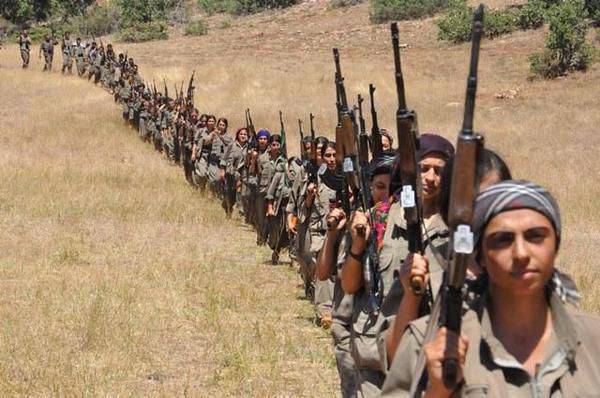
Another very strong and dangerous player is neighboring Turkey. Naturally, Turkey, which has the largest enclave of Kurds in the Middle East in its territory and population, will never, at least sincerely, support the Kurdish national liberation movement even in other states. Turkey sees a dangerous precedent and a negative example for its own Kurds in creating wide political autonomy in the territory of Syrian Kurdistan. Moreover, there is an obvious ideological affinity between the Kurdistan Workers Party, operating in Turkey, and the Democratic Union, operating in Syrian Kurdistan. Therefore, Turkey is focused on weakening Syrian Kurdistan and is blocking the Turkish-Syrian border in order to prevent the supply of weapons and other goods for Syrian Kurds. Turkey also does not allow Kurds - Turkish citizens, who are going to fight as volunteers as part of the people's self-defense detachments, across the Syrian border, purposefully seeking to limit any assistance opportunities for the Syrian Kurds. The blockade of the border by the Turkish side creates a lot of problems for Syrian Kurdistan, including humanitarian ones, as it directly impedes the transportation of humanitarian supplies to the region, including those sent to help thousands of refugees hiding in Syrian Kurdistan.
In June, the Tayyip Erdogan 2015 declared openly that Turkey would never allow the creation of a new independent state of the Kurds on its southern borders and would apply all possible forces and resources to hinder this idea. Thus, Ankara once again signed in its openly anti-Kurdish position. And this is at a time when the Kurdish militia at the limit of forces leads a bloody war with the militants of the "Islamic State". Obviously, the ideas of Turkish nationalism, implying, among other things, the denial of the need to create Kurdish autonomy or statehood, in the minds of the Turkish ruling elite still prevail over the desire to protect the Middle East from the terrorist threat from the IG. Preventing full-fledged cooperation between Turkish and Syrian Kurds for Ankara is much more important than helping to defeat the formations of the “Islamic State”. In addition to considerations of preserving the territorial integrity of Turkey and the domination of the Turkish nation in the country, the ideology of the Syrian Kurds is also causing discontent. The model of the socio-political system that is being implemented in Syrian Kurdistan very frightens the ruling circles of Turkey and other states of the region. After all, the emergence of non-capitalist democratic public education, even if autonomy within the Syrian state, is a very serious indication of the ineffectiveness of the capitalist model, the “market democracy” approved by the United States of America and its satellites as the main and almost only vector of social and economic political development of modern society. Kurdish political analyst Jamilya Kochoyan argues that it is Turkey that is also interested in overthrowing the Assad regime, and, even more, in weakening and suppressing the Kurdish national movement. According to J.Kochoyan, the Turks are even ready to come to terms with the activities of the “Islamic State”, if only the Islamists have fulfilled an important function - they would destroy the beginnings of Kurdish democratic and socialist statehood in Northern Syria.
As for the United States, although they formally demonstrate their support to all national minorities in the Middle East, they are also actually in a camp hostile to the Kurdish national movement of Syrian Kurdistan. After all, it was the United States that formed and launched radical fundamentalist projects in the Middle East, prepared the ground and conditions for armed uprisings in a number of Arab countries. Finally, the US troops and armed forces of the US satellites took and take part in hostilities on the territory of the Middle Eastern states. Moreover, the United States does not see much sense in the recognition of Syrian Kurdistan, and does not want to quarrel with the Turkish leadership. Since Turkey is the only more or less efficient country in the region, which is, among other things, a member of the NATO bloc, the opinion of the Turkish leadership for the American leadership and command has a certain authority. Washington will not quarrel with Ankara, stimulating the struggle of the Kurds for creating their own state.
Finally, very complex relations are developing among Syrian Kurds from the Democratic Union with their closest neighbors and fellow tribesmen - Iraqi Kurds. Here there is a political confrontation between supporters of M. Barzani and the political line pursued by him, and the Democratic Union. Syrian Kurds are more radical than their Iraqi counterparts, oriented toward large-scale democratic and socialist transformations. Tens of thousands of immigrants from Rodzhava - Syrian Kurdistan - today are in the territory of Iraqi Kurdistan, where they are waited for by more or less tolerable wages. In addition, the military-political situation in Iraqi Kurdistan is much more calm than in the north of Syria. The leadership of the Kurdistan Democratic Party, ruling in Iraqi Kurdistan, hopes over time to push the Democratic Union from leading the national movement of the Syrian Kurds, for which it carries out the training and training of the fighters of the Popular Self-Defense Forces on its territory. This training is conducted by fighters and commanders not related to the Democratic Union. True, it is hardly possible that the representatives of one political tendency of the Kurdish national liberation movement will raise arms against their fellow tribesmen, guided only by ideological and political contradictions.
Syrian Kurdistan is in a very difficult situation - politically, militarily, and economically. The more valuable and unique is the experience of the political forces that dominate the Rjava territory, which are trying to build a truly democratic and socially oriented society on the lands controlled by the Kurdish militia. Time will tell whether the Kurds of Syria will be able to maintain their political independence and simply survive in such a hostile environment. It is quite likely that the hour is close when the largest people in the world without a state will acquire its political sovereignty, repelling the threats of all its many opponents and preventing the construction of a totalitarian fundamentalist state in the ancient Kurdish land.
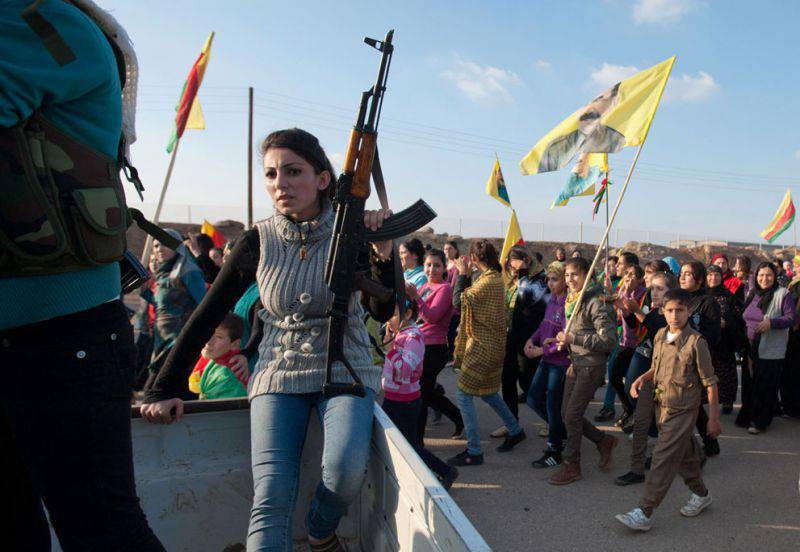
Information